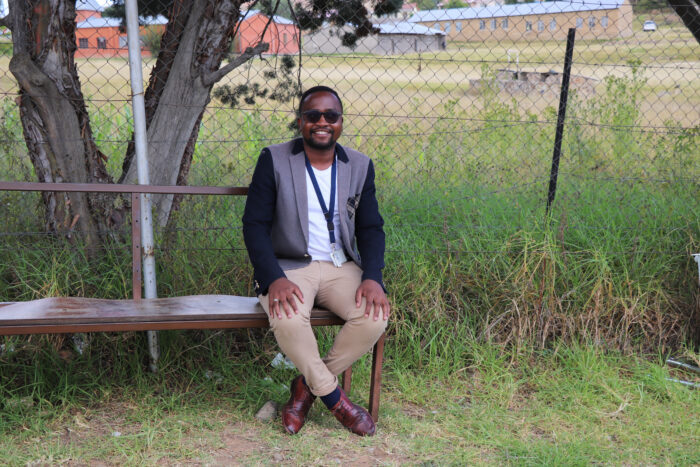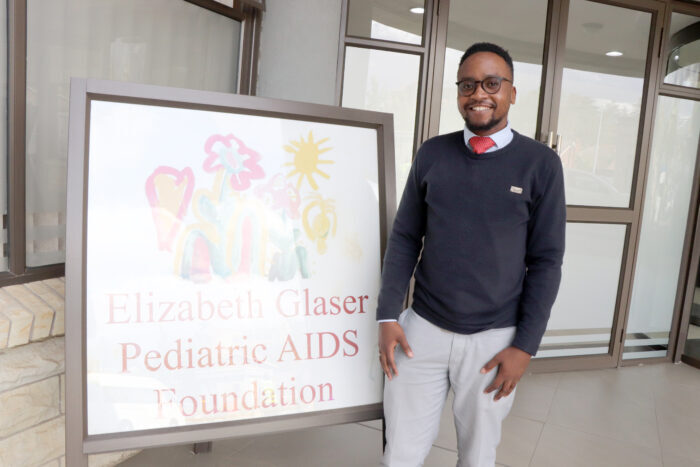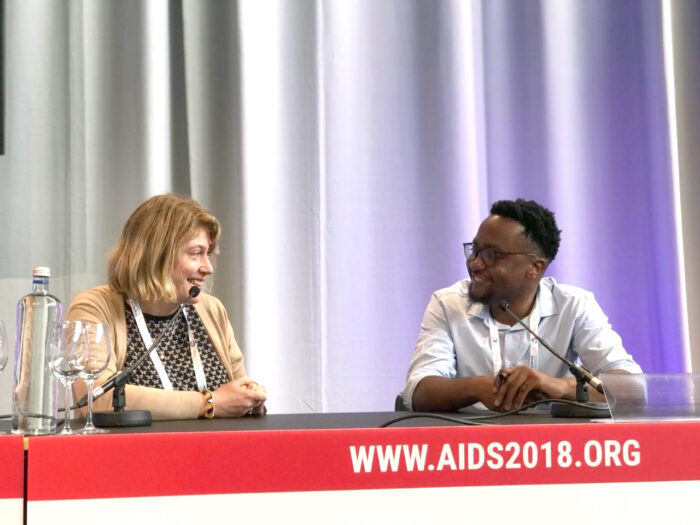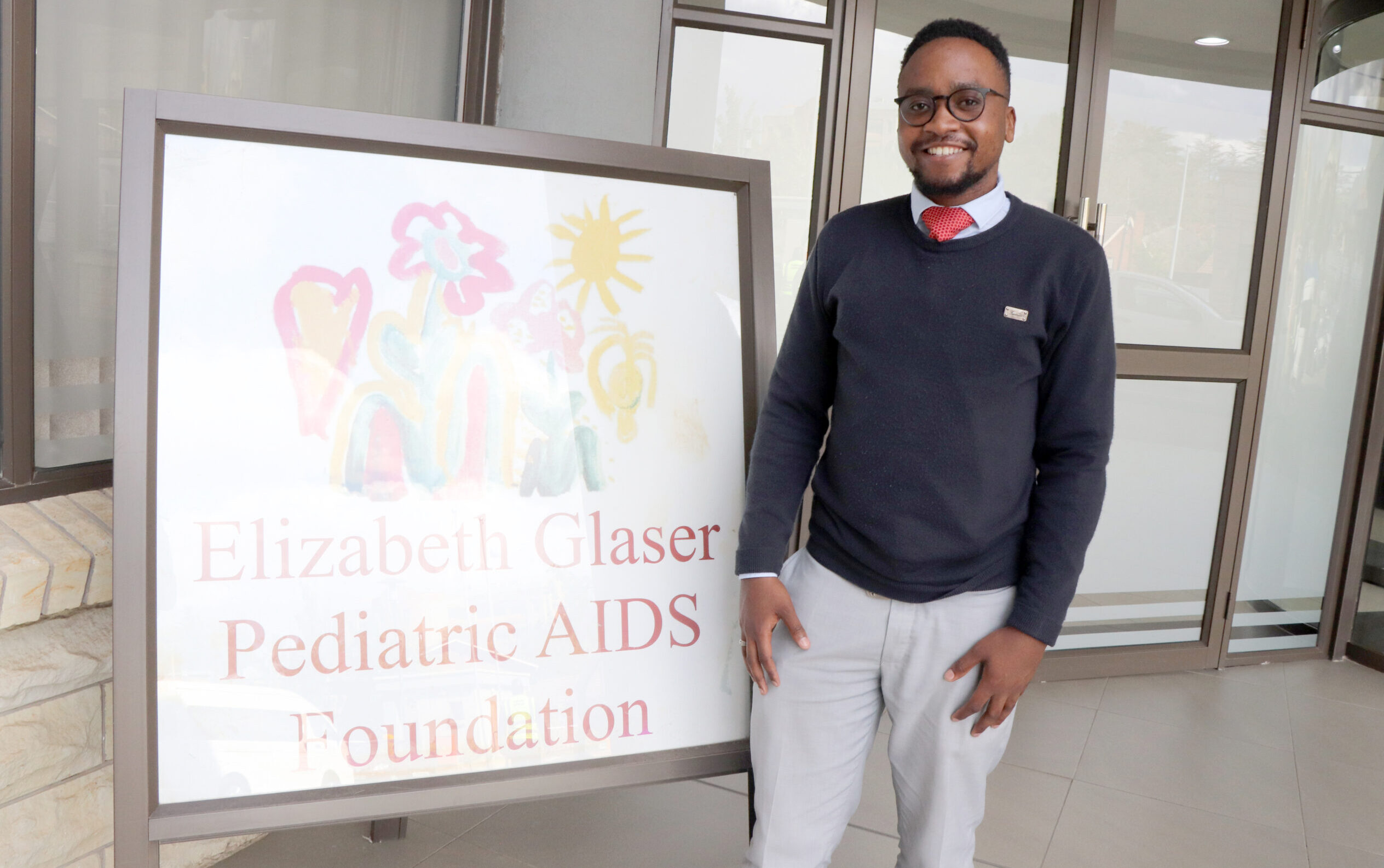Kananelo Khalla, 25 and healthy, is a living testament to the scientific approach of managing and treating HIV. He is a new father, living in the mountain kingdom of Lesotho, where more than a quarter of individuals 15-59 are HIV-positive. But in the eyes of his HIV-free son, Kananelo sees a new day for his nation.

“We all aspire for the gift of an AIDS-free generation,” says Kananelo. “For those who were born with HIV, it is time to heal wounds of the past and build bridges to the brighter future. I can now proudly say to my son that HIV ended with us—because, with prevention of mother-to-child HIV transmission, an HIV-free generation is now a reality.”
Because of his passion and hard work as an advocate for young people living with HIV, Kananelo was recognized in September 2019 as one of 10 Basotho HIV and AIDS PEPFAR champions by Her Majesty Queen ‘Masenate Mohato Seeiso and U.S. Ambassador Rebecca Gonzales. PEPFAR, the U.S. President’s Plan for AIDS Relief, has been working in Lesotho since 2007, helping to provide HIV services through the Lesotho Ministry of Health, local civil society organizations, and international nongovernmental organizations like the Elizabeth Glaser Pediatric AIDS Foundation (EGPAF).
From HIV-Positive Child to HIV Activist
 When he was 12 years old, Kananelo learned that he is living with HIV. He was ill, and he went to health center, where he was diagnosed with TB. Health workers also asked about his HIV status. Kananelo and his mother decided to get tested for the virus, and both were found to be HIV-positive.
When he was 12 years old, Kananelo learned that he is living with HIV. He was ill, and he went to health center, where he was diagnosed with TB. Health workers also asked about his HIV status. Kananelo and his mother decided to get tested for the virus, and both were found to be HIV-positive.
“My journey starting as an HIV-positive child to becoming an HIV activist has not been very easy,” says Kananelo. “I faced so much stigma and discrimination during my childhood—especially at school. I was regularly teased because of illnesses that resulted in symptoms such as rashes and swollen lymph nodes. It was very difficult to wake up and lift myself up each day, believing that I could survive despite the circumstances and believing that one day I would be a grown-up adult or that I would be an HIV survivor—who today is sharing his life testimony freely with everyone,” he says.
“We all aspire for the gift of an AIDS-free generation. It is time to heal wounds of the past and build bridges to the brighter future.” Kananelo Khalla
“Some people wanted to break me, but they only made me stronger; others wanted to exploit me, but they only made me smarter,” says Kananelo. “One of my biggest dreams was to adhere to my antiretroviral (ARV) treatment in order to stay healthy and live longer.”
Kananelo says that he was able to survive and come to terms with his status because of the support that he received from his family, health workers and peers. He gives that support back to others who are now coming to terms with HIV.
“In 2016 I attended the AIDS Conference in Durban, South Africa, with other HIV positive youths,” says Kananaelo. “In Druban, I did a radio interview, where I first disclosed my status. Immediately after I left the studio, I got calls and messages of support on social media. Some of the youth who reached out to me told me they were also HIV-positive but scared to disclose their status, and they were encouraged by my disclosure.”
Adolescents Need Special Services
 “It is from this conference onwards that I started speaking about my status publicly,” says Kananelo. “I decided that my focus will be to advocate for youth-friendly HIV and AIDS services.”
“It is from this conference onwards that I started speaking about my status publicly,” says Kananelo. “I decided that my focus will be to advocate for youth-friendly HIV and AIDS services.”
In 2017, Kananelo was among young HIV activists who participated in a roundtable meeting, hosted by Prince Harry, with global donors who support HIV and AIDS programs.
“We shared our life experiences, challenges, and recommendations for youth-friendly HIV services,” says Kananelo. “We wanted things to be different so that programming would be better geared toward our needs by us helping to shape it.”
That year, Kananelo became an EGPAF youth ambassador. He has been trained to sensitize and mobilize young people to adopt healthy behaviors—starting with testing for HIV and seeking other HIV services at youth-friendly facilities that feature an adolescent corner.
Kananelo says that the health care workers at the adolescent corners are welcoming and caring. The health workers engage personally to make sure that their young clients show up for appointments and adhere to their antiretroviral medication. Among the services provided at adolescent corners are sexual and reproductive health services and health education as well as HIV prevention services such as condoms distribution and pre-exposure prophylaxis (PrEP) initiation. They also facilitate peer support groups discussions, where the young people find support as they navigate the social realities of disclosing their HIV status to intimate partners or to family members.
Kananelo says that stigma and discrimination against HIV come from ignorance and fear of the unknown. The effect becomes even worse when the stigma comes from family, friends, or a trusted health care worker.
“It is time for young people living with HIV to know that their health is in their hands.” Kananelo Khalla
Stigma easily leads to depression, which especially impacts young people who are in denial of their HIV status, according to Kananelo. Some youths are ashamed or scared to disclose their status or take their ARVs in front of their family and friends.
“Some are even scared to have intimate relationships and end up lonely and isolate themselves from their peers,” says Kananelo. “Without support structures, some even resort to suicide.”
“I appeal to all adolescents and young people living with HIV to join peer support groups. I can attribute my strength to the psychosocial support that I received from the youth clubs and youth camps,” says Kananelo. “We need more support of this nature to reach all young people living with HIV.”
“It is time for young people living with HIV to be empowered to know that their health is in their hands,” says Kananelo. “They should not allow other people or their HIV status bring them down.”
Fatherhood
Today, Kananelo is happily married to an HIV-free partner, and the couple has a 1-year-old son who is also HIV-free.
“Being an HIV-positive father and having an HIV-free child can be compared with excitement of falling in love for the first time,” Kananelo says, beaming. “I had a good bond with my late father, and when I grew up I always looked forward that one day I would be a good father just like my dad.”
He also finds tremendous relief and fulfilment in his relationship. “My wife is my other half, and she completes me. She is the mother of our son. She accepted and loved me unconditionally despite my HIV status, and I am grateful for that.
“Believe it or not, when one is loved and cared for, the heart and soul are filled with happiness,” says Kananelo. “The love and caring affection received from friends, family, and even strangers are really important to people living with HIV, as it is a proof to us that we are accepted as we are.”
And now that he is a father, Kananelo hopes that he is setting a leadership example.
“Fathers should know that they are the key agents of change to reach epidemic control. The power of an AIDS-free generation is in our hands.” Kananelo Khalla




